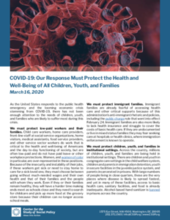This page contains documents and other resources related to children's care in the Americas. Browse resources by region, country, or category.
Displaying 981 - 990 of 3191
Este documento de ONU Mujeres describe los impactos e implicaciones de COVID-19 para mujeres y niñas en América Latina y el Caribe, incluyendo el riesgo más alto de violencia.
This factsheet from Generations United provides grandparents who are raising grandchildren with resources and information on how to stay healthy, informed and connected in light of the COVID-19 pandemic.
This statement from the Center for the Study of Social Policy emphasizes the need to respond to the needs of children, youth, and families who are likely to suffer most during the COVID-19 crisis, including children, youth, and families in institutional settings and families involved in the child welfare system.
This study investigates tensions between stated goals and experiences of foster care, from the perspective of (formerly) fostered youth.
The U.S. National Family Support Network is holding a Certification Training on the nationally-adopted Standards of Quality for Family Strengthening & Support on 13 March 2020 in New York, NY, USA.
This presentation explores the structures and programs one university system is creating for college students emerging from foster care (SEFC).
The present study of children’s caregivers involved in child welfare examined the factors associated with their receiving services for substance use.
This article offers a comprehensive look at the LGBTQ foster youth population in the U.S., its vulnerabilities, and its distinct needs.
RELAF will be holding its 2020 international seminar in Mexico on 11 and 12 March 2020.
Este video describe brevemente la investigación de la Red Latinoamericana de Egresados de Protección coordinado por DONCELque estudió cómo se dan los egresos de las y los adolescentes que crecieron bajo el sistema de protección del Estado, lejos de sus familias por haber sufrido abusos, maltratos y violencia.




